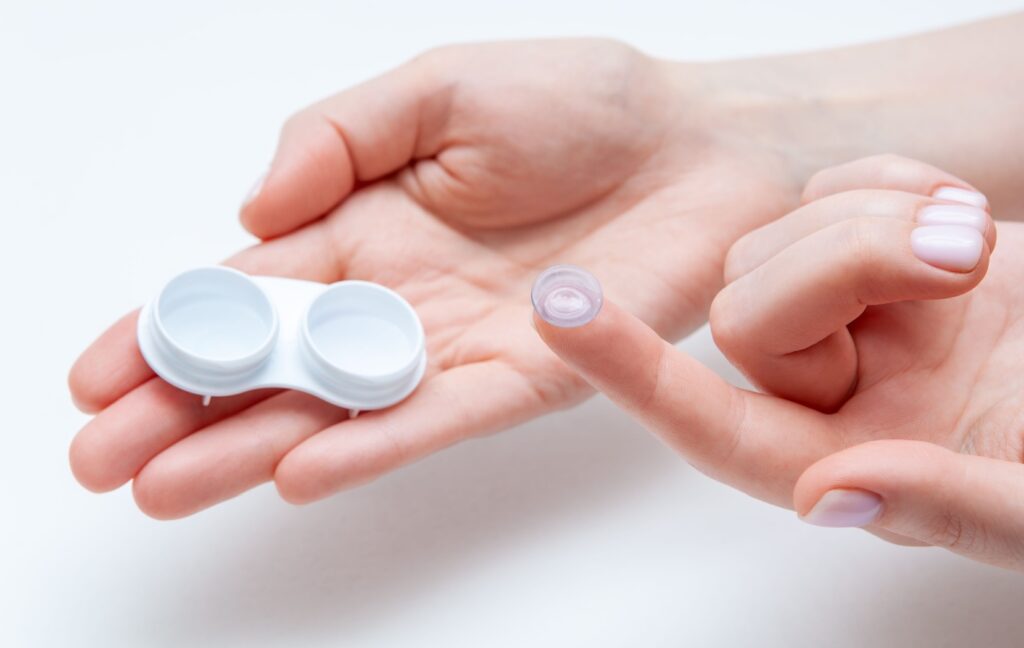Vision correction has come a long way, offering more choices than ever to help people see clearly. Among the most widely used options today are contact lenses.
These small, thin lenses work similarly to eyeglasses by changing how light is refracted onto the retina at the back of the eye, helping you see more clearly. However, the closer fit means the prescription requires additional measurements to bend light effectively.
Contact lenses can offer convenience and comfort whether you’re dealing with nearsightedness, farsightedness, astigmatism, or age-related conditions like presbyopia.
The Science of Contact Lenses
Contact lenses correct vision in a similar way to how glasses work. Both work by refracting and focusing light directly onto the retina, the light-sensitive part of the eye. However, contact lenses offer a more subtle profile because they sit directly on your cornea, the clear front of your eye.
The close fit provides wearers with a broader field of vision than glasses, as lenses correct the entire view without obstructing frames. The lenses also require different measurements than glasses to create that closer fit.
Contact lenses are available in various materials and designs to accommodate all types of vision challenges. However, it’s essential to understand the options and how they address specific eye conditions to choose the right lens.
Types of Contact Lenses
Contact lenses aren’t one-size-fits-all. They come in many types, each serving different purposes.
Soft Lenses
Soft contact lenses are the most popular type, thanks to their comfort and flexibility. Made from gel-like, water-containing plastics, they allow oxygen to pass through and help keep your eyes healthy. Soft lenses come in various replacement options:
- Daily disposables for those looking for convenience & less daily maintenance
- Bi-weekly or monthly lenses for regular wearers who don’t mind maintaining their lenses
Rigid Gas-Permeable (RGP) Lenses
Although they may not be as comfortable as soft lenses initially, RGP or “hard” lenses offer sharper vision and enhanced durability. RGB lenses can be ideal for people with complex prescriptions or conditions like keratoconus.
Specialty Lenses
Certain eye conditions require unique solutions. Specialty lenses include:
- Toric lenses for astigmatism with unique features correct irregularly shaped corneas
- Multifocal lenses for presbyopia to help correct near & far vision
How Contact Lenses Correct Vision
Let’s examine common refractive errors to understand how contact lenses can help improve vision. These vision conditions occur when the shape of your eye prevents light from properly focusing on the retina.
Myopia (Nearsightedness)
People with myopia (nearsightedness) experience blurry distance vision. The condition happens when your eyeball is too long, and light focuses in front of the retina instead of directly on it. Contact lenses correct this by diverging light rays to focus accurately on the retina.
Hyperopia (Farsightedness)
Opposite to myopia, hyperopia (farsightedness) occurs when the eyeball is too short, causing light to focus behind the retina. Contact lenses correct this by converging light rays to the proper focal point.
Astigmatism
People with astigmatism have irregularly shaped corneas or lenses within the eye. Toric lenses are designed with multiple optical powers to address this uneven curvature and help provide sharper vision.
Presbyopia
Presbyopia is an age-related condition that happens when your eye’s natural lens loses flexibility, making it difficult to focus on nearby objects. Multifocal contact lenses can mimic natural vision by offering different zones for near, intermediate, and far distances.
Choosing the Right Contact Lenses
Finding the ideal contact lenses involves more than just grabbing a pair off the shelf. Several factors come into play, including your prescription, lifestyle, and personal preferences. Here are some tips to keep in mind:
- Schedule a contact lens exam & fitting
- Prioritize your comfort & maintenance preferences
- Consult your optometrist about your budget & insurance options
At West Coast Optical, our experienced optometrists will walk you through the lens options that align with your needs and preferences.
Caring for Your Contact Lenses
Proper care is essential to help your contact lenses work effectively and maintain your eyes’ health. Here’s how to maintain them like a pro:
- Keep your hands clean when handling your lenses to avoid introducing bacteria
- Never rinse your lenses with water or saliva
- Use contact lens cleaning solutions recommended by your optometrist
- Follow the wear schedule—wearing them longer than the recommended timeframe can increase the risk of irritation or infection
Why Consulting an Optometrist Matters

Contact lenses may seem simple, but your lenses are medical devices that require a proper fit and ongoing care. A contact lens exam and fitting with an optometrist helps:
- Correct your vision effectively
- Maintain your eye health
- Suit your specific prescription & lifestyle
Take the First Step Toward Clearer, Comfortable Vision
Contact lenses can offer versatility and convenience for anyone looking to correct their vision without wearing glasses. Whether you’re new to contact lenses or seeking an improved fit, our team at West Coast Optical is here to help.
Book your contact lens exam today and discover why so many of our patients trust us to enhance their vision.



